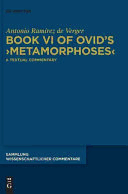
Book VI of Ovid's Metamorphoses: A Textual Commentary PDF
Preview Book VI of Ovid's Metamorphoses: A Textual Commentary
Antonio Ramírez de Verger Book VI of Ovid’s Metamorphoses Sammlung wissenschaftlicher Commentare Antonio Ramírez de Verger Book VI of Ovid’s Metamorphoses A Textual Commentary De Gruyter ISBN 978-3-11-073082-1 eBOOK (PDF) 978-3-11-073178-1 ISSN 1864-3426 Library of Congress Control Number: 2020951844 Bibliographic information published by the Deutsche Nationalbibliothek The Deutsche Nationalbibliothek lists this publication in the Deutsche Nationalbibliografie; detailed bibliographic data are available on the Internet at http://dnb.dnb.de. © 2021 Walter de Gruyter GmbH, Berlin/Boston Typesetting: Dörlemann Satz, Lemförde Printing: CPI books GmbH, Leck www.degruyter.com G. Lvck (†) optimo magistro et dvlcissimo amico ORBA PARENTE SVO QUICVMQUE VOLVMINA TANGIS, HIS SALTEM VESTRA DETVR IN VRBE LOCVS. QVOQVE MAGIS FAVEAS, NON SVNT HAEC EDITA AB IPSO, SED QVASI DE DOMINI FVNERE RAPTA SVI. QVIDQVID IN HIS IGITVR VITII RVDE CARMEN HABEBIT, EMENDATVRVS, SI LICVISSET, ERAT. Ov. trist. 1.7.35–40 Acknowledgements This commentary on book 6 of Ovid’s Metamorphoses is based on a reading of a substantial proportion of the manuscripts which have transmitted the text and on a study of the editions that have established it and commented on it from the editiones principes down to the present day. I have systematically included the readings of the codices of ss. IX–XIII1, all the Spanish manu- scripts, including the excerpta, and the Heinsii codices mei known to date (B5EOO4 CGf4P8P9 O9 O12O15O17). Readings from other codices have been included for the most important passages. Unlike the commentaries of, for example, F. Bömer or the editors of the Fondazione Valla, the approach centres on the text and the problems deriv- ing from it, along the lines of N. Heinsius or P. Burman to name the two most significant editors of Ovid. At the same time, I have endeavoured, as an editio cum notis variorum, to recall the finest contributions by scholars from R. Regius (1493) to the present day: Regius (1493, 1510), Naugerius (1516), Ciofanus (15832), Bersman (15963), Heinsius (1659), Burman (1727), Gierig (18042, 18072), Bothe (1818a and 1818b), Bach (1831 and 1836), Loers (1843), Haupt (1853), Merkel (1850, 18782), Riese (1872, 18892), Edwards (1894), Magnus (1914), Ehwald (1915), Slater (1927), Haupt-Ehwald-von Albre- cht (1966), Bömer (1969–2006), Rosati (2009), Kenney (2011), Reed (2013), Díez Reboso (2014), Suárez (2005), Fàbregas (2016) and Hardie (2016). Log- ically, I have also included the contributions towards Ovid’s text by editors and commentators in the course of their work on other Latin authors, such as Gronovius (1611–1671), Bentley (1662–1742), Markland (1693–1776), Madvig (1804–1886), Housman (1859–1936) and Shackleton Bailey (1917– 2005), to mention only a few. It goes without saying that the most recent editions, commentaries, articles and reviews must also be added. Special mention is warranted for the modern editions by Goold (19842), Anderson (19915), and Tarrant (2004). This volume has been produced as part of an ongoing project to publish commentaries on all of the books of Ovid’s opus magnum, undertaken by the Nicolaus Heinsius Research Group at the University of Huelva. The com- mentaries for books XIII (Luis Rivero, De Gruyter 2018) and XV (Georg Luck, Huelva 2017) have been published so far. It is envisaged that the coming years will see the appearance of the remaining volumes. I would like to express my deepest thanks to my fellow researchers in these rewarding Ovidian labours over the years: Juan A. Estévez, Luis Rivero, José Antonio Bellido, Samuel Díez Reboso, Pere Fàbregas, Juan Fernández Val- https://doi.org/10.1515/9783110731781-201 VIII Acknowledgements verde, Miriam Librán and Ángela Suárez del Río. I am greatly indebted to all of them. It goes without saying that I have not forgotten my mentor, Prof. Georg Luck, who revised a draft of this commentary before his death (2013). It is no exaggeration to recall his constant affability and availability to all of us. The errors, needless to say, are mine. I would also like to thank J. J. Zoltowski for his translation of the book from Spanish into English. This edition with commentary has proved possible thanks to support from a number of institutions in the form of various Research Projects, financed by the Spanish Government (FFI2008-01843, FFI2013-42529), the Regional Government of Andalucía (HUM-1019, HUM-4534) and the University of Huelva (through its ‘Plan Propio de Investigación’ and the Huelva Univer- sity Library). Huelva, January 2021 Contents Acknowledgements ............................................ VII Introduction. . . . . . . . . . . . . . . . . . . . . . . . . . . . . . . . . . . . . . . . . . . . . . . . . . 1 I. Manuscripts .............................................. 1 II. Editions ................................................. 21 Bibliography ................................................. 35 A textual Commentary ......................................... 61 I. Aracne in araneam (1–145) ................................. 68 II. Niobe in lapidem (146–312) ................................ 118 III. Lycii coloni (313–381) .................................... 178 IV. Marsyas in flumen (382–400) .............................. 201 V. Pelopis umerus in eburneum (401–411) ...................... 209 VI. Tereus, Procne et Philomela (412–674) ...................... 211 VII. Boreas et Orithyia (675–721) ............................. 304 Appendixes .................................................. 315 Readings of Manuscripts ..................................... 315 Readings of Editions ......................................... 351 Indexes ..................................................... 373 Select index of textual problems ............................... 373 Index locorum .............................................. 377 Index nominum ............................................. 413
